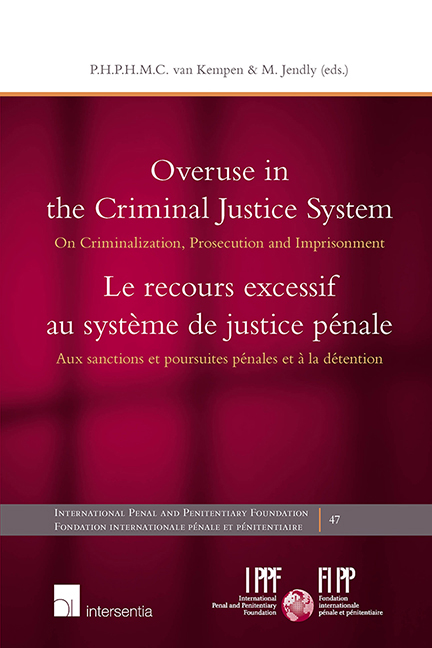Book contents
- Frontmatter
- Dedication
- Contents
- Acknowledgements
- Remerciements
- PART I INTRODUCTORY SYNTHESIS AND ANALYSES 1ÈRE PARTIE. SYNTHÈSE ET ANALYSES INTRODUCTIVES
- PART II THEMES 2ÈME PARTIE. THÈMES
- Overuse of the Criminal Justice System: Analytical Approach, Rules and Practices
- The Overuse of Criminal Justice in the Case Law of the European Court of Human Rights
- Overuse of Criminalization: a Philosophical and Political Approach on the Latin-American Situation
- Overprosecution and Negotiated Justice in Europe
- The American Experience with the Prosecutorial Overuse of Plea Bargaining
- Overuse of Imprisonment: Statistical Analyses of Incarceration Rates Across the World
- Minimising Prisonisation and the Harms of Custody
- Criminal Policy and Imprisonment. The Case of Lithuania: Open Prisons, Prison Leave and Release on Parole
- PART III NATIONAL REPORTS 3ÈME PARTIE. RAPPORTS NATIONAUX
- The International Penal and Penitentiary Foundation: history and purpose
- La Fondation internationale pénale et pénitentiaire: histoire et objectif
- The IPPF Series
Criminal Policy and Imprisonment. The Case of Lithuania: Open Prisons, Prison Leave and Release on Parole
from PART II - THEMES 2ÈME PARTIE. THÈMES
Published online by Cambridge University Press: 26 June 2019
- Frontmatter
- Dedication
- Contents
- Acknowledgements
- Remerciements
- PART I INTRODUCTORY SYNTHESIS AND ANALYSES 1ÈRE PARTIE. SYNTHÈSE ET ANALYSES INTRODUCTIVES
- PART II THEMES 2ÈME PARTIE. THÈMES
- Overuse of the Criminal Justice System: Analytical Approach, Rules and Practices
- The Overuse of Criminal Justice in the Case Law of the European Court of Human Rights
- Overuse of Criminalization: a Philosophical and Political Approach on the Latin-American Situation
- Overprosecution and Negotiated Justice in Europe
- The American Experience with the Prosecutorial Overuse of Plea Bargaining
- Overuse of Imprisonment: Statistical Analyses of Incarceration Rates Across the World
- Minimising Prisonisation and the Harms of Custody
- Criminal Policy and Imprisonment. The Case of Lithuania: Open Prisons, Prison Leave and Release on Parole
- PART III NATIONAL REPORTS 3ÈME PARTIE. RAPPORTS NATIONAUX
- The International Penal and Penitentiary Foundation: history and purpose
- La Fondation internationale pénale et pénitentiaire: histoire et objectif
- The IPPF Series
Summary
INTRODUCTION: VIEW TO THE PRESENT THROUGH THE PAST
Lithuania is a small and the southernmost Baltic country with just about 3 million inhabitants. On 11 March 1990, Lithuania proclaimed its independence after Soviet occupation, which lasted for almost 50 years. Lithuania is a member of NATO and of the European Union since 2004.
From criminological research and analysis we know that historical and cultural contingencies, structural features of countries’ legal and social systems and distinctive cultural and historical characteristics have a powerful influence on the reality of criminal policy. After almost 30 years of independent legislation and the creation of a separate criminal justice system the influence of a long punishment culture and tradition is still appreciable.
The modern independent Republic of Lithuania was established in 1918, following the end of the First World War and the collapse of the Russian Empire. Lithuania had become a part of the Empire at the end of the 18th century, after almost 500 years of statehood, the Grand Duchy of Lithuania (the largest country in Europe) and a voluntary two-state union, the Polish-Lithuanian Commonwealth. In 1918, when the independence of Lithuania was restored, the Russian Criminal Statute of 1903 was proclaimed as coming into force (in its entirety) in Lithuania, with some changes. The practise of punishment was relatively harsh, and the Republic of Lithuania had one of the highest levels of imprisonment rates in Europe.
The Soviet ideology in place since 1944 brought a new totalitarian thinking. Crime, according to Soviet ideology, was a phenomenon that could not take root in a socialist society and that must inevitably die out there. The crimes that still existed were explained as being caused by remnants of capitalism in the consciousness of individual Soviet citizens and foreign influences. This meant a corresponding approach to deal with people who (still) committed crimes. They had to be either “corrected” or “re-educated” and exploited as a cheap labour force. In order to implement this ideology the Criminal Code and the Criminal Enforcement Code, and the infrastructure of penal institutions and education of staff was developed. Imprisonment was often used, and sentences were usually long, especially for repeated crimes. The recidivism (repeated criminal behaviour) was “an indication” of incomplete correction or re-education and by subsequent sentencing, recidivists were automatically punished with much longer imprisonment sentences.
- Type
- Chapter
- Information
- Overuse in the Criminal Justice SystemOn Criminalization, Prosecution and Imprisonment, pp. 229 - 250Publisher: IntersentiaPrint publication year: 2019
- 1
- Cited by



